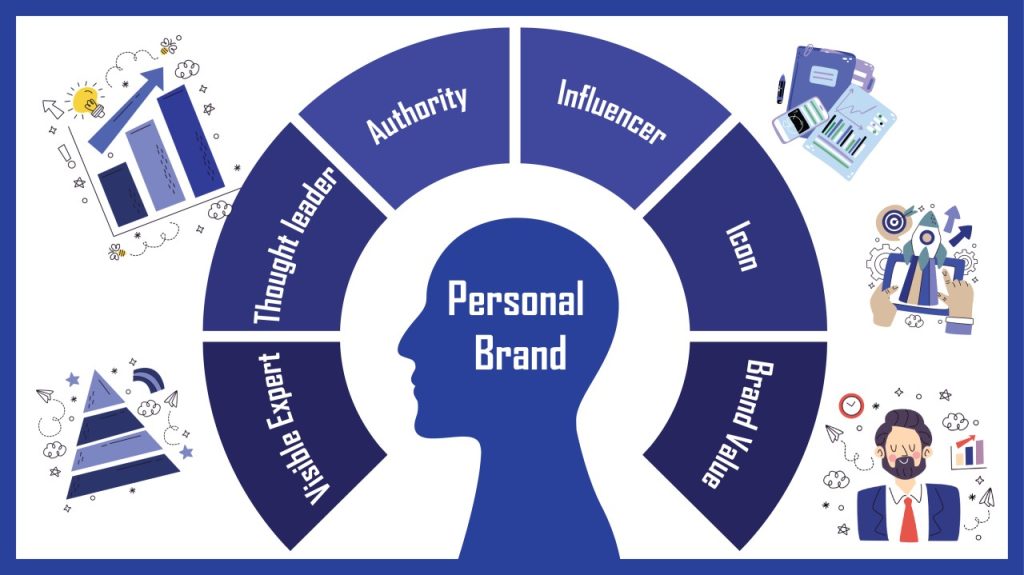1) What is a personal Brand?
A personal brand is the unique combination of skills, experiences, and personality that an individual presents to the world. It is the way you promote yourself and encompasses the following elements:

Reputation: What you are known for and how others perceive you.
Values and Beliefs: The principles that guide your actions and decisions.
Skills and Expertise: Your professional abilities and areas of knowledge.
Personality: The traits and characteristics that make you unique.
Vision and Goals: Your future aspirations and what you aim to achieve.
Developing a strong personal brand involves defining who you are, what you stand for, and how you want to be perceived. It is about consistently presenting yourself in a way that aligns with your goals and values, both online and offline. A well-crafted personal brand can help you differentiate yourself in the job market, attract opportunities, and build a network of contacts who share your professional interests.
2) What are the Advantage of Building a Personal Brand?
Building a personal brand offers numerous advantages, both professionally and personally. Here are some key benefits:

Increased Visibility and Recognition:
Stand Out in Your Field: A strong personal brand differentiates you from others in your industry.
Attract Opportunities: Visibility can lead to speaking engagements, media features, and job offers.
Career Advancement:
Networking: A personal brand helps you connect with influential people in your industry.
Career Mobility: A strong reputation can make career transitions smoother and faster.
Credibility and Trust:
Authority: Consistently sharing knowledge and expertise builds your reputation as a thought leader.
Trustworthiness: People are more likely to trust and do business with someone they recognize and respect.
Increased Income Potential:
Higher Demand: A recognized brand can command higher fees and salaries.
Multiple Income Streams: Opportunities for consulting, speaking, writing, and teaching can emerge.
Personal Satisfaction and Confidence:
Sense of Achievement: Building a personal brand is a testament to your hard work and expertise.
Confidence: Recognition and respect from peers and the industry boost self-confidence.
Better Professional Relationships:
Meaningful Connections: A strong personal brand attracts like-minded professionals and collaborators.
Mentorship and Collaboration: Opportunities to mentor others and work on exciting projects increase.
Control Over Your Narrative:
Consistency: You can control the message and image you want to project.
Reputation Management: Actively managing your personal brand helps mitigate negative information or misconceptions.
Business Growth:
Client Attraction: Personal brands often translate to more business and better clients
.Customer Loyalty: Clients and customers tend to be more loyal to individuals they trust and respect.
3) How should one maintain Personal Brand?
Maintaining a personal brand involves consistently presenting yourself in a way that aligns with your values, skills, and goals. Here are some key steps to help you maintain a strong personal brand:

1. Define Your Brand
Identify Your Strengths and Unique Selling Points (USPs): Understand what makes you stand out.
Set Clear Goals: Know what you want to achieve with your personal brand.
2. Consistency
Online Presence: Ensure that your social media profiles, website, and any online presence are consistent in terms of imagery, tone, and messaging.
Offline Presence: Maintain the same level of professionalism and branding in face-to-face interactions as you do online.
3. Create Valuable Content
Share Knowledge: Write blogs, make videos, or share posts that provide value to your audience.
Engage: Respond to comments and engage with your audience regularly.
4. Network
Build Relationships: Connect with influencers, mentors, and peers in your industry.
Attend Events: Participate in industry conferences, webinars, and networking events.
5. Stay Authentic
Be Genuine: Authenticity builds trust. Ensure that your personal brand reflects who you truly are.
Transparency: Be honest about your strengths and areas for improvement.
6. Monitor and Adjust
Gather Feedback: Regularly ask for feedback from trusted peers and mentors.
Analyze Your Impact: Use analytics tools to see what content is resonating with your audience.
Evolve: Be prepared to adapt and refine your brand as you grow and as the market changes.
7. Professional Development
Continue Learning: Stay updated with the latest trends and skills in your industry.
Certifications: Obtain relevant certifications to enhance your credibility.
4) What is Brand Endorsement?
Brand endorsement is a marketing strategy where a company uses a public figure or a celebrity to promote its product, service, or brand. This strategy leverages the popularity, credibility, and influence of the endorser to enhance the brand’s image, reach a wider audience, and build trust with consumers. Here are some key aspects of brand endorsement:

Credibility and Trust: Celebrities and public figures often have a loyal fan base and are seen as trustworthy by their followers. When they endorse a product, it can lend credibility and trust to the brand.
Increased Visibility: Using well-known personalities helps increase the brand’s visibility. The endorser’s presence in advertisements, social media, and events can attract more attention to the brand.
Emotional Connection: Fans often feel a strong emotional connection to their favorite celebrities. When these celebrities endorse a brand, it can create a similar emotional bond between the brand and the consumers.
Influence on Purchasing Decisions: Endorsers can influence the purchasing decisions of their fans. If a consumer sees their favorite celebrity using or recommending a product, they may be more inclined to buy it.
Targeted Marketing: Brands often choose endorsers who resonate with their target audience. For example, a sports brand might choose an athlete as an endorser to appeal to sports enthusiasts.
Brand Differentiation: In competitive markets, brand endorsements can help a company stand out from its competitors. A popular endorser can differentiate a brand and make it more memorable.
Thanks for reading.